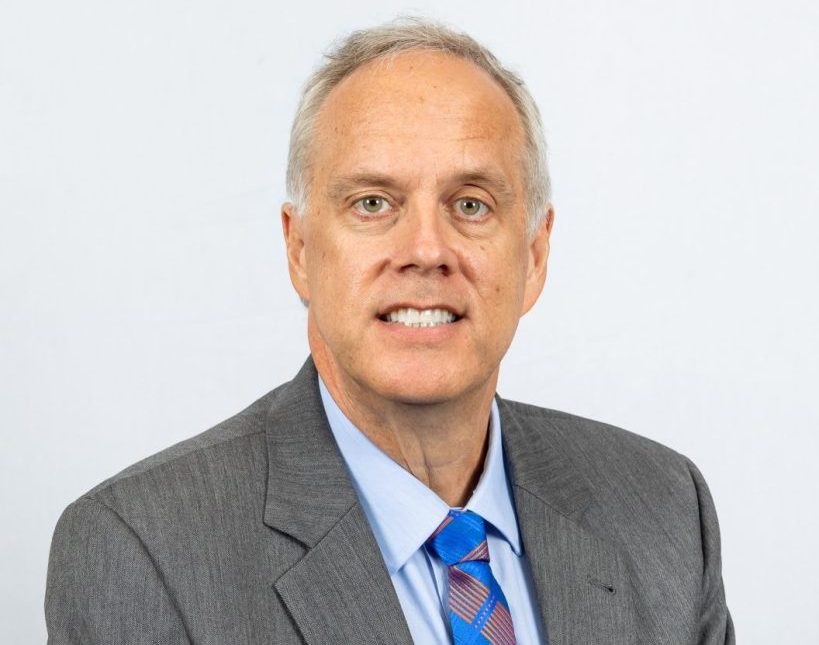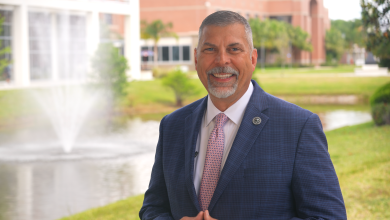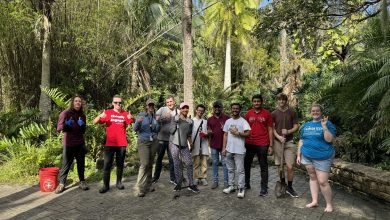New Dean at College of Engineering and Science Brings Experience, Vision
John G. Harris Seeks to Boost Research Funding, Rankings
MELBOURNE, FLA. — John G. Harris, Ph.D., a distinguished scholar and accomplished leader who oversaw dramatic increases in faculty and research funding as chair of University of Florida’s electrical and computer engineering department, is the new dean of Florida Tech’s College of Engineering and Science.
Harris started at Florida Tech July 1.
He spent 29 years at UF, the Gainesville institution with more than 53,000 students, including the last 11 years as department chair. He arrived in the Sunshine State after earning his bachelor’s and master’s degrees in electrical engineering at Massachusetts Institute of Technology and his Ph.D. in computation and neural systems at California Institute of Technology.
With its small size – a total student population of about 2,400 – and more focused educational offerings, Caltech is “most similar” to Florida Tech, Harris said.
“One of the things I took away from Caltech was the commitment to excellence they have. To me, it’s excellence and impact that I want to bring to Florida Tech,” he said. “I want to make Florida Tech the Caltech of the east.”
Already, the university has what Harris called “pockets of excellence,” and he is eager to work with Marco Carvalho, executive vice president and provost, to implement a shared vision.
“He is a big reason why I am coming to Florida Tech. We meshed when I talked to him; our vision for Florida Tech was similar,” Harris said of Carvalho. “That’s a big draw for me – someone there with a vision for the future.”
What does that vision look like? At COES, it looks like a college with built-in advantages – smaller classes, highly regarded faculty, outstanding career placement – that now must take the next step. That means moving up in rankings from U.S. News & World Report, for one.
“Even though there are questions about how rankings are done, people pay attention. Faculty, Ph.D. students when looking for a school, undergrads – every which way, people look at rankings. Even employers consider rankings,” Harris said. “Rankings by themselves are not important, but all of these rankings are based on metrics that matter very much.”
Annual department research expenditures surged more than 150 percent over Harris’s tenure as department chair at UF, approaching nearly $24 million. That is the 7th largest expenditure among all electrical and computer engineering departments in the U.S.
“Florida Tech is poised to expand its research program, also,” he said. “I see a great opportunity to make an impact.”
Another of Harris’s priorities is developing students who are more than just excellent engineers and scientists. They need to be exposed to topics and areas they may not normally explore, from data science to communication, he believes.
“To keep up with what’s going on in society, in industry, in research, we need to prepare students for going out into the real world,” he said. “That is a shortcoming at many, many schools – not enough emphasis on new things that are happening. Programming, data science, algorithms – you can’t ignore them no matter what your engineering field is.”
Additionally, Harris saw how foreign students, and many American students, benefitted from mock interviews and exposure to other soft skills. “These kinds of activities were more useful than taking more technical courses. They can make much more of an impact on students’ careers.”
Florida Tech’s location amid the burgeoning aerospace sector excites Harris. He did alumni outreach and company visits at UF, but Gainesville is not as heavy with industry as the Space Coast.
“I’m really looking forward to that difference at Florida Tech. Given all of the companies around, there can be more involvement – adjunct teaching, internship programs, industry feedback and collaboration on curriculum and research, all kinds of things,” he said.
But first on the to-do list for Harris: listening.
“There is going to be a lot of listening in the beginning. My leadership style is to not make decisions without inputs,” he said. “I will talk to as many faculty, staff, undergraduates, graduate students, alumni and industry leaders as possible – figure out what things are slowing us down at Florida Tech, and what can be improved.”
Harris, 61, was born and raised in Holmdel, New Jersey, about an hour outside of New York City. His father was a civil engineer, and young John was into math and science, “so it was natural to go into engineering,” he said.
At MIT, Harris became interested in the brain and neural systems, and how to solve engineering problems with inspiration from the brain. He knew people at Caltech, so after graduating with his degrees from MIT, Harris headed west. He started in a Ph.D. program co-founded by Nobel Prize-winning physicist and Caltech faculty member Richard Feynman, computational and neural systems.
“Computational and neural systems combines disciplines such as electrical engineering, computer science and neuroscience,” Harris said.
From Caltech, Harris spent two years as a postdoctoral fellow at the MIT Artificial Intelligence Lab. In 1993, he came to UF as an assistant professor in electrical engineering.
Beyond the classroom, Harris is father to two adult children. His son graduated from UF this year with a major in the classics – “students need to go and find their passion,” Harris said – and has accepted an offer to teach high school at the private Oak Hall School in Gainesville. His daughter, a sophomore, is majoring in computer science at UF. She is working this summer as an intern with National Instruments in Austin, Texas. Harris is moving to Melbourne with his fiancée Wendy Huang, a UF graduate and an experienced software developer.
Also, Harris is a very good chess player. He holds a 1700 ranking from the U.S. Chess Federation (players in the 1700-1900 range have “reached a level of mastery that most chess players will never reach,” according to chess.com).
He even has a chess tournament named after him, thanks to a 60th birthday gift last year from more than 50 of his former students. The Dr. John G. Harris Chess Championship is held through the Gator Chess Club (where Harris was faculty advisor). At the inaugural tournament, playing in the top division due to his ranking, Harris fared well but lost to the eventual tournament winner.





